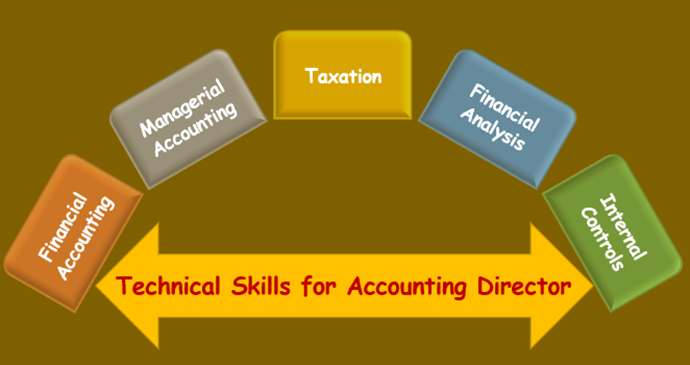Accounting Director Qualifications and Skills
If you are skilled at accounting, consider being an accounting director. Explore an exciting career path. It can take you to the peak of your profession. This article will explore the qualifications and skills. They are needed to become successful accounting directors.
Unsplash+In collaboration with Getty Images
Role of an Accounting Director
An accounting director is a senior-level position. They oversee the accounting function in an organisation. An accounting director manages a company’s financial operations. This includes financial reporting and accounts payable and receivable. They also handle budgeting, forecasting, and compliance with accounting standards.
They also ensure compliance with rules. They manage relationships with many stakeholders. These include internal and external auditors and regulators.
An accounting director’s role is critical to an organisation’s financial health and success. The accounting director ensures the financial information follows accounting standards. They also provide key financial insights to senior management.
Qualifications of an Accounting Director
The qualifications for accounting directors may vary. They depend on the organization and the specific role. They should have relevant education, experience, and skills. These will enable them to manage the accounting department well.
- Education Requirements: Accounting directors should have a solid education. They should also have professional certifications. These show their expertise in accounting and finance. They should also engage in continuing education to stay updated with changes in the field.
- Academic Education: Accounting directors should have at least a bachelor’s degree in accounting, finance, or a related field. Some organisations may need a master’s degree in accounting or business administration. You need a strong background in accounting, finance, economics, and math for this role.
- Certification: Many organisations prefer or need their accounting director to have a professional certification. These accounting certifications show great expertise. They show deep knowledge of accounting and finance. Also, certifications can help. They are in areas such as fraud examination, internal auditing, or financial analysis.
- Continuing Education: Accounting is always changing. Directors should stay current with standards, rules, and tech changes. Many professional organisations offer continuing education. The programmes provide updates and training in relevant areas.
Photo by Kelly Sikkema on Unsplash
Experience Requirements for an Accounting Director Role
The experience requirements for an accounting director role can vary. It depends on the organisation and industry. Generally, they should have significant experience in accounting, financial management and leadership.
Most organisations need accounting directors to have at least 10–15 years of experience. They must have worked in accounting or finance roles. They must also have at least five years of experience in a leadership or management role. Some groups may also need industry experience. This could be in public accounting, financial services, or a specific type of business, such as technology or manufacturing.
Experience in analysing financial statements, budgeting, and forecasting is valued. So is experience with regulatory compliance and internal controls. These are valued for an accounting director position. Also, experience in leading a team and developing staff is essential. They often supervise and mentor other accounting and finance professionals.
Technical Skills for the Accounting Director Role
The accounting director should have solid technical knowledge of accounting. They should also know about finance and related areas. They should be able to use this knowledge to run accounting and give financial advice to the senior team. Here are some of the technical skills an accounting director should have:
- Financial Accounting: The accounting director should understand financial accounting principles. These include standards such as GAAP, IFRS, and SOX. They should prepare yearly financial statements. They should do economic analyses and oversee the preparation of reports.
- Managerial Accounting: The accounting director should use managerial accounting. They should use it to analyse financial data for decision-making. They should be able to prepare budgets and forecasts. These budgets and forecasts must align with the organisation’s strategic goals. They should be able to develop realistic projections. These come from historical data and industry trends.
- Taxation: An accounting director should know tax laws and regulations. They should check the tax implications to ensure compliance.
- Financial Analysis: Accounting directors should be able to analyse the company’s financial data. They should also develop economic models to support strategic decisions. They should have strong analytical skills and be able to use financial data to identify trends and patterns.
- Internal Controls: An accounting director should understand internal accounting controls well. They should be able to set them up and watch over them. This is to ensure compliance with accounting policies, standards, and regulations.
Soft Skills for an Accounting Director Role
Besides technical skills, an accounting director should have both solid and soft skills. These skills are essential for managing accounting well. They are also key for working with other departments to achieve the organisation’s goals. Some of the crucial soft skills for an accounting director are listed below:
- Leadership Skills: Accounting directors need strong leadership skills. They must inspire and motivate the accounting team. They should be able to set clear goals, provide guidance and direction, and foster a positive work environment.
- Communication and Interpersonal Skills: Accounting directors should communicate complex financial concepts to non-financial stakeholders. They should be able to prepare and present financial reports. They should also tell senior management about the financial results. They should work with other departments.
- Problem-Solving: Accounting directors should have strong problem-solving skills to identify issues and develop solutions. They should be able to analyse financial data. They should be able to identify trends and patterns. Then, they should make recommendations to improve financial performance.
- Time Management: Accounting directors should be able to manage their time effectively and prioritise tasks. They should be able to work under pressure, meet deadlines and manage many projects simultaneously.
- Attention to Detail: Accounting directors should have a keen eye for detail and be able to ensure accuracy and completeness in financial reports.
- Adaptability: Accounting directors should be adaptable and able to manage change. They should be able to adjust to new technologies, accounting standards and regulations.
Technology Skills for an Accounting Director Role
Technology is changing accounting. An accounting director must have strong technical skills. The organisation needs them to ensure they use technology well. This will streamline accounting operations and protect sensitive financial information. Here are some technical skills that an accounting director may need:
- Knowledge of Accounting Software: An accounting director should understand and have experience with accounting systems and software. Examples include QuickBooks, SAP, and Oracle. They are used to manage financial data and streamline accounting.
- Data Analytics: The accounting function is becoming more data-driven. The accounting director must have strong data skills. They need to analyse financial data and give insights. These insights will help drive business decisions.
- Cybersecurity: Cybersecurity threats are a big concern for organisations. An accounting director needs to understand cybersecurity risks. They must know security measures to protect financial information.
- Cloud Computing: Many organisations are moving their financial operations to the cloud. The accounting director should be skilled in cloud computing. This is to ensure that the organisation uses cloud-based tools well.
- Business Acumen of an Accounting Director: Accounting directors need business acumen. It helps them understand the broader business context in which the organisation operates. Business acumen is a thorough understanding of the company’s industry. This includes industry trends, competitors, customer preferences, and internal processes.
- Business acumen lets accounting directors think strategically and creatively. They can find new ways to add value by seeking opportunities for growth and innovation in the organisation.
Career Path of Accounting Directors
An accounting director’s career can vary based on many factors. These include their level of education and experience, the type and size of their organisation, and their career goals.
Most start their journey with entry-level positions, such as interns or trainees. Then they move up the career ladder by gaining experience in many finance roles. These include analysts, accountants, assistant accounting managers, and accounting managers. There’s also the financial controller and, after several years, the accounting director.
Job Opportunities for an Accounting Director Position
An accounting director is a senior leader in accounting and finance. Many job opportunities are available in many industries. As organisations expand, the need for skilled accounting directors will only grow.
Many large corporations have accounting director positions. These need high financial expertise and leadership to manage accounting. Start-ups may also need to hire an accounting director. The director will manage their funds and guide them to improve their financial practices.
Non-profits need accounting directors. They manage the organisation’s finances and ensure compliance with regulations. At the same time, government agencies at the federal, state, and local levels may have accounting director roles. These roles involve managing the agency’s financial operations.
Tips for the Resume of an Accounting Director Role
A good resume for an accounting director role should show the candidate’s relevant experience. It should also show their education, certifications, and technical skills. It should also highlight their achievements. It should also emphasise soft skills. The following tips may help you create an impactful resume for the Accounting Director role:
- At the top of your resume, include a professional summary. It should highlight your credentials and convince the employer that you are qualified for this role.
- Your resume should show your education and experience in accounting and finance. It should also show your skill at managing finances and overseeing accounting.
- As an accounting director, you must have strong leadership and management skills. Include examples. For instance, examples of how you have led teams, developed talent and helped your organisation succeed.
- Highlight your experience using accounting software. Emphasise your technical skills, such as accounting and finance principles. Also, emphasise your skills in financial analysis, budgeting, and forecasting.
- Include examples of your achievements. They show how you have helped your organisation succeed. For example, by improving finances,. This can be done by making processes faster or by setting new accounting standards.
- Show your strategic thinking. Do this by highlighting your experience making financial plans and forecasts. These plans and forecasts support organisational goals.
- Besides these sections, ensuring the resume is well-written, easy to read and visually appealing is vital.
- Tailor the CV to the job posting. Show how the candidate’s skills match the job description for the accounting director.
- Finally, adding industry-specific terms and phrases to the CV will make it stand out. Enterprises widely use automated application tracking systems (ATS). These systems take industry-specific keywords and phrases into account.
Potential Challenges to the Accounting Director Job Role
Accounting directors have job duties. These duties come with many challenges. The challenges affect their effectiveness and success. These challenges may include meeting rules, changes in technology, and strategy failure. They may also include talent management, money issues, and strict reporting lines.
Yet, by staying current with industry trends and learning new skills. Accounting directors can beat these challenges. They can also drive the organisation’s success.
Accounting Director vs CFO or Financial Controller
An accounting director, chief financial officer, and financial controller all manage finances. Yet, their specific roles and focus can differ based on the organisation’s size, industry, and goals.
Accounting directors focus mainly on accounting and finance. Financial controllers oversee day-to-day accounting. CFOs provide financial strategy and guidance.
Future of the Accounting Director Role
The accounting director’s role should change. This is in response to trends and developments in accounting and finance. Data analytics and business intelligence will change the role of the accounting director. So will regulatory compliance, globalization, and strategic partnerships.
As technology advances, many routine accounting tasks will become automated. To succeed in the future, accounting directors will need new skills. They must also adapt to the ever-changing business environment.
To learn more about a career in accounting, please visit our resources page or search for accounting job roles here.
Job Seekers
On the hunt for your next role? Upload your CV below and we’ll be in touch to discuss your requirements.
Employers
For employers seeking the right skills and cultural fit for your business, send us your vacancy to find out more about how we can help.
Submit CV Send Us Your VacancySearch Jobs
Popular this week
- What Qualifications And Skills Are Needed To Be An Accountant?
- How Does Industry 4.0 Differ From The Previous Generation?
- Agile For Accountants: Six Steps To Provide Necessary Tools And Relevant Processes
- What Are The Main Differences Between ACA and ACCA?
- What Are The Top Five Financial Accounting Facts For #AccountantsDay







